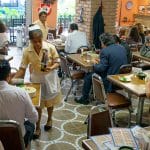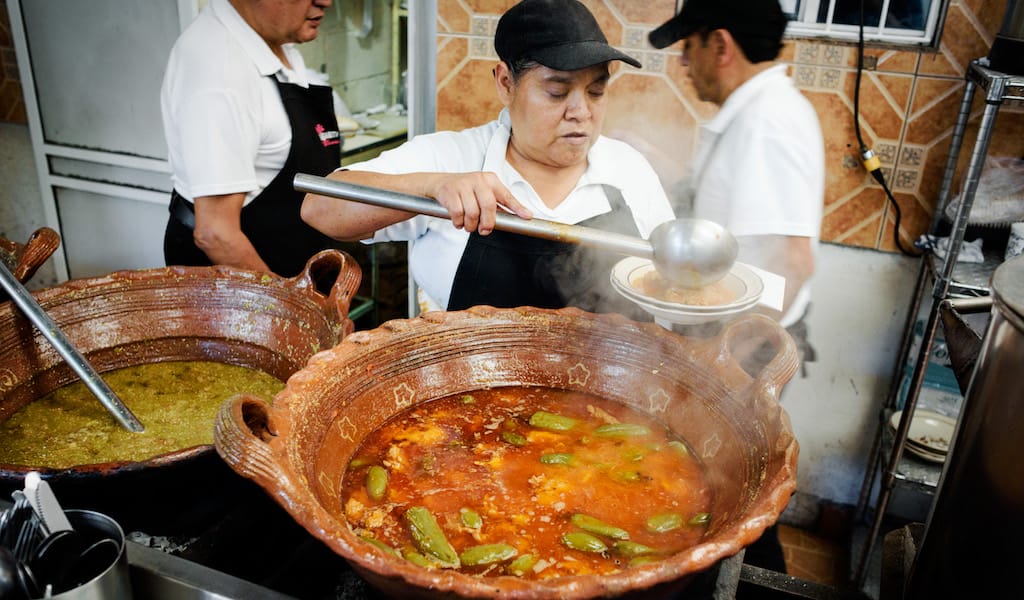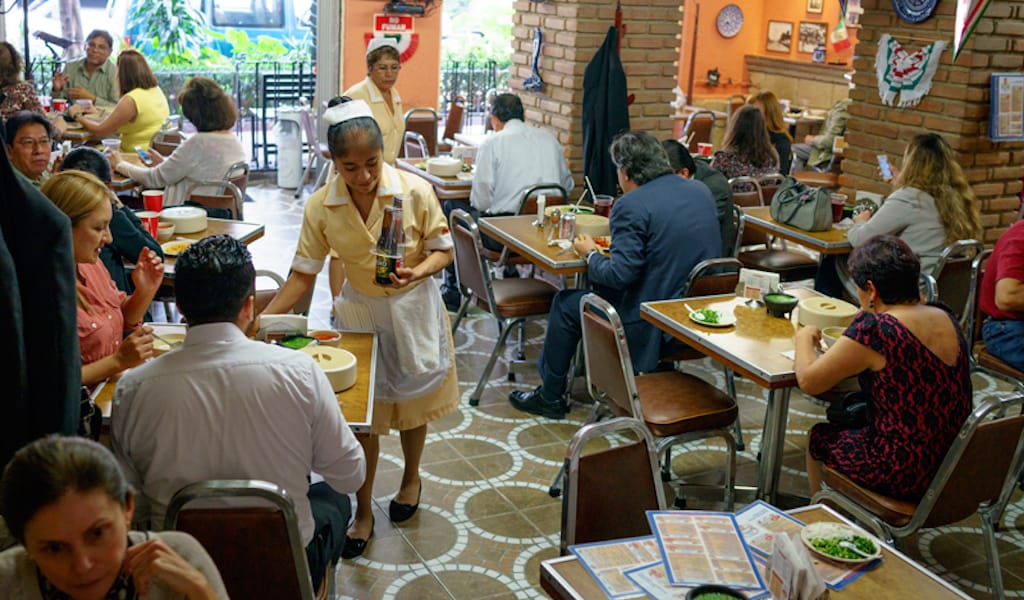With a simple façade, the unassuming Fonda Margarita sits next to a carwash and wouldn’t attract much attention if it weren’t for the line out the door and around the block by the time it opens at 5:30 a.m. Construction workers come at the crack of dawn, office workers arrive in shifts and sleepy teenagers meander in just before they close at 11 a.m.
“We’re traditional,” says owner Richard Castillo when we ask him why his restaurant, which only serves breakfast, is so popular, “and there aren’t many traditional places left in Mexico City. We still cook using clay pots and 100 percent coal-fired grills.”
Those steaming clay pots sit like sentinels at the front of the fonda, the name usually given to a small, family-run restaurant, with meat patties and a handful of hot peppers floating in their depths. Every dish is a recipe that Ricardo’s mother, Margarita Lugo de Castillo used to make. “Except for the chilaquiles,” he clarifies, “those are new.”

“My father worked as a cook in the United States in the 1950s,” Castillo says, “and he would send my mother dollars but nobody wanted to change them, so she had to do something else to keep us fed and decided to set up a stand selling food in the park right here in front of the restaurant.”
That was back when the neighborhood, Colonia del Valle, was quite different. In the 1950s, when his parents lived in a small house behind the church, the surrounding neighborhood was more like a small, rural town – the outskirts of Mexico City. Castillo, along with his brother and sister, with whom he co-owns Fonda Margarita, has been helping in the restaurant since its inception, when it was a makeshift hut made of Carrizo reeds on what is now Tlacoquemecatl Street.
When their father returned from the United States, he and Margarita used all those unchanged dollars that she had been setting aside to purchase the building where the restaurant is now located.
“We’re traditional,” says owner Richard Castillo, “and there aren’t many traditional places left in Mexico City.”
Musicians Rafael and Victor greet everyone at the door, acting both as seating control and soundtrack, with Rafael on guitar and Victor on the cabasa, a percussion instrument. These two have been a fixture at Fonda Margarita for 13 years, but playing together for more than 20. They arrive each morning at 7 a.m. to croon love songs to a crowd happily devouring their breakfast.
Customers sit at long, family-style tables, close enough to illicit an obligatory “buen provecho” (“bon appétit”) from each diner as they come and go. Waiters zip across the dining room carrying bowls of the daily guisados – hearty chunks of meat in exquisitely spiced sauces.
Roasted hunks of tender pork swim in a tangy green tomatillo sauce, slices of beef are flavored with heady pasilla chiles, and fresh tortillas steam in their basket. The café de olla, a traditional coffee prepared with piloncillo, a type of unrefined cane sugar, and cinnamon, is pucker-up sweet and combined with a few churros covered in sugar and cinnamon will put you into diabetic shock. But breakfast, like life, is all about the perfect balance between sweet and salty – add an order of eggs mixed with refried beans (huevos tirados) or a massive helping of chilaquiles (tortilla strips simmered in salsa, although only those made with green salsa are served at Fonda Margarita) and you can recover your flavor balance.

According to staff, the most popular dishes are pig crackling (chicharron) in green sauce or the pork in green sauce, which is why these two guisados show up every day on a menu that rotates throughout the week. That said, the meatballs in tomato sauce, with just a hint of mint and a roasted serrano chile floating in the bowl, are out of this world (come on Tuesday for that special).
Each of these dishes surfaces from the monster clay cazuelas that fill the kitchen and hang on the walls of the fonda alongside an image of the Virgin of Guadalupe and a photo of their mother, Margarita Lugo, for luck. Maria de Jesus, Ricardo’s sister, runs the cash register and kitchen with the attention of a drill sergeant, Ricardo manages the tiny office in the back and Joel, the other brother, also helps to run the kitchen and manage the restaurant. One or all of them is usually there to greet customers.
While you will find eaters from all over the world sitting amongst the crowd – what started out as a whisper from a few in-the-know locals to food-obsessed travelers has slowly transformed into a Mexico City culinary mecca – regulars looking for their daily fix are by far the most prevalent. They are greeted with a familiar smile and then hustled through like everybody else – there are lots of people waiting, and everyone is hungry.
 March 28, 2019 Chilakillers
March 28, 2019 Chilakillers
Editor's Note: The Santa Maria de Ribera location is sadly no longer open.
When […] Posted in Mexico City February 23, 2023 Beatricita
February 23, 2023 Beatricita
In a town that runs on tacos, tacos de guisado may be the most ubiquitous version of the […] Posted in Mexico City November 15, 2021 Kikliko
November 15, 2021 Kikliko
The Georgian culinary experience is all about the dinner, stereotypically a glutton’s […] Posted in Tbilisi
Published on February 22, 2020
Related stories
March 28, 2019
Mexico CityEditor's Note: The Santa Maria de Ribera location is sadly no longer open. When Brenda Miranda and her partners started Chilakillers seven years ago, it was on a lark. They were freelancers – like so many young professionals in Mexico City – who needed some extra cash and thought, “Who doesn’t love chilaquiles?” The only…
February 23, 2023
Mexico CityIn a town that runs on tacos, tacos de guisado may be the most ubiquitous version of the iconic dish in Mexico City. They can be found almost anywhere in the city, from specialty restaurants to markets, tianguis and street vendors selling them at stalls or even out of the trunk of a car. It…
November 15, 2021
TbilisiThe Georgian culinary experience is all about the dinner, stereotypically a glutton’s nirvana of singularly delicious foods stacked plate by plate to the ceiling alongside beer pitchers full of wine. This might explain why, after a night of belt-popping gourmandizing, there is very little in the way of a breakfast culture in Tbilisi. Another explanation…



















































































